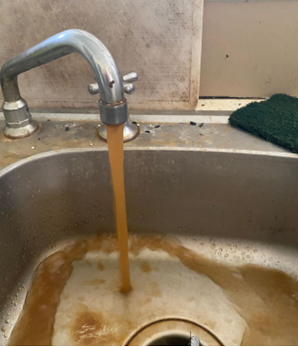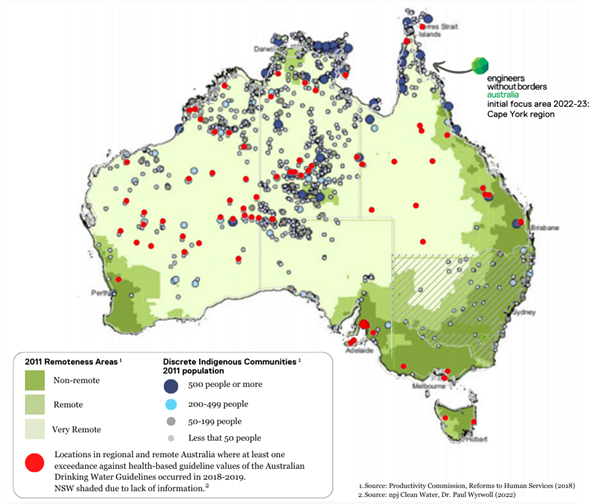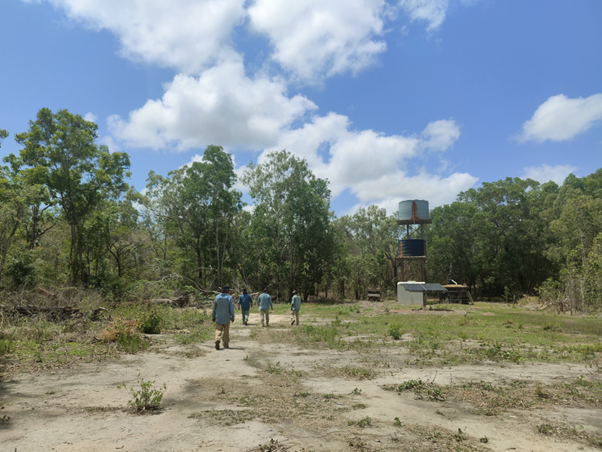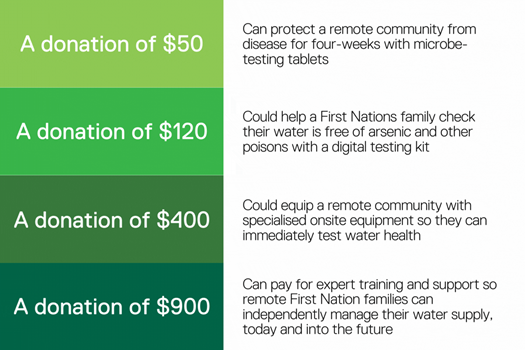First Nations families must not be the last to access clean, safe, disease-free drinking water. You can support Engineers Without Borders Australia’s Engineering On Country appeal this giving season
Access to safe and reliable water is a basic human right, and essential for health and quality of life, and is the focus of Sustainable Development Goal #6. Yet not all remote First Nations communities can access it.
The Engineers Without Borders Australia Engineering on Country (EoC) Water Program aims to ensure First Nations communities in remote Queensland and Western Australia can access a safe, clean, reliable and climate-resilient water supply; the knowledge to safely operate and maintain their systems; and the governance structure to support it - for the long term. Water safety planning and testing has begun with communities in Far North Queensland.
The water problem
 This image shows what came out of the tap in a remote Indigenous community that EWB visited in Far North Queensland in November 2022.
This image shows what came out of the tap in a remote Indigenous community that EWB visited in Far North Queensland in November 2022.
It is estimated that at least 250,0001 Aboriginal and Torres Strait Islander peoples are unable to reliably access safe and healthy water on their remote homelands, and as such experience chronic and hygiene-related diseases at higher rates than other Australians. Water contamination is considered a key cause. Children in particular have unacceptably high rates of common health issues, such as middle-ear infections, skin and respiratory issues, and gastroenteritis. These infections have serious impacts, including permanent hearing loss and heart disease. This can affect education outcomes and opportunities. It also leads to chronic diseases in adulthood, contributing to the 17-year gap in life expectancy between First Nations people and other Australians2. The remoteness of these communities makes routine water testing and infrastructure development challenging. Lack of funding is also another key factor - remote community water supply often does not fall under public water service provision.
 There are over 1,100 remote Indigenous communities in Australia. Many of the remote and very remote communities lack access to safe, clean water.
There are over 1,100 remote Indigenous communities in Australia. Many of the remote and very remote communities lack access to safe, clean water.
Building trust and two-way knowledge sharing
Community is at the centre of EWB’s approach and the EWB EoC Water Program is no exception. Aboriginal and Torres Strait Islander people and communities are best placed to identify their needs and key priorities to improve access to essential services, health, wellbeing and opportunities. EWB works with communities to design and provide access to appropriate and sustainable community infrastructure and technology that improves their quality of life and their ability to pursue education, employment or income generating opportunities. Facilitating two-way knowledge sharing and developing respectful relationships are essential to design the right solutions. Key to this is building trust, nurturing relationships and working together in partnership so that First Nations people can live on, and care for, Country.
Community-owned water management for long-term supply
For over fifteen years, water and sanitation have been a focus at EWB - in Australia and overseas. EWB’s EoC Water Program builds on this work and aims to co-design fit-for-purpose, fit-for-place water supply systems. This new program includes designing water supply and treatment facilities together that build on local Indigenous water knowledge of their area. It also includes understanding the potential hazards and risks to the water supply that may exist, and co-developing management and governance plans for water systems to manage these risks.
The risk to a water supply is the greatest when there is no regular monitoring and maintenance activities. Simple monitoring activities and plans are developed with the community members for when maintenance, repairs and replacements of equipment may be needed. Water testing kits providing accuracy levels for key components are being provided - similar to results achieved within an accredited laboratory - and community members are supported to routinely verify the water health and safety.
Through designing these projects directly with elders, rangers and other community members, communities have ownership of the project and the benefits to their community. This ownership leads to community-managed water supply protection, testing, treatment, maintenance and operation.
The community water management plans are the beginning of a regular monitoring and maintenance regime that will continually improve the water supplies in each of the participating communities. EWB’s EoC Water Program is currently focused on working with communities in remote locations in Queensland and Western Australia. The program commenced with water safety planning, infrastructure and testing in two communities located in Far North Queensland, alongside community partner, the Centre for Appropriate Technology (CfAT).
Improving water testing and existing infrastructure for remote First Nations communities
EWB continues to work alongside long-time community partner CfAT with an initial focus on communities of the Cape York Peninsula in Far North Queensland. EWB and CfAT have been working with one such remote community in improving its water supply for many years.
Over that time, there have been a number of challenges, including a flooding event that destroyed the previous water pump. Remote, place-based challenges have ongoing impacts on effective functionality of key water infrastructure. As a result, this remote community regularly has no water. This has revealed the critical importance of establishing monitoring and maintenance plans and training to keep the water system running.
 Site visits with community in Cape York, November 2022
Site visits with community in Cape York, November 2022
Initial works commenced in May 2022 with EWB’s First Nations Principal Water Advisor, Leah Sertorio, and CfAT’s Regional Manager, Andre Grant. They have been conducting water testing on the remote community’s water supply and supporting maintenance works to get the water treatment system back up and running again.
The focus now is on convening community workshops which aim to test technical assumptions, review hazards and risks, and better understand the community requirements and their unique water supply system. Fundamental to this process is integrating local water knowledge into how the water supply system is designed and operated.
An Indigenous Land Enterprise Infrastructure Fund grant has been obtained through the Commonwealth National Indigenous Australians Agency to enable some water supply upgrades. However, more funding support is urgently needed.
EWB FIRST NATIONS END-OF-YEAR APPEAL 2022
This December, you can donate to support this vital work. With enough support, EWB will be able to scale this program to reach more remote communities and have an even broader impact.
You can use this link www.ewb.org.au/firstnationsappeal-awa to donate.


